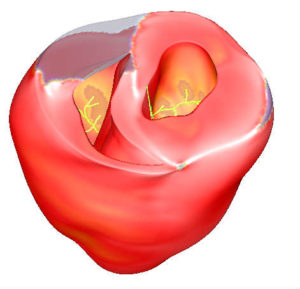 The Allinea Forge parallel code development suite is helping to speed up exciting computational cardiology research at the Medical University of Graz.
The Allinea Forge parallel code development suite is helping to speed up exciting computational cardiology research at the Medical University of Graz.
Utilizing the power of the VSC-3 supercomputer at the University of Vienna, Postdoctoral researcher Dr. Aurel Neic and his team are developing a simulation framework for the human heart called the Cardiac Arrythmia Research Package (CARP). It replicates the electric, mechanic and haemodynamic (the forces associated with the flow of blood) phenomena in the heart in a coupled manner and is bringing exciting new possibilities to medical science.
The simulation requires a highly parallel numerical code, running on hundreds, if not thousands of CPU cores. To speed up their research, the team turned to Allinea Forge which provides a debugger (Allinea DDT) and profiler (Allinea MAP) to assist in developing and debugging the highly parallel numerical code and its associated management code.
“Before using Allinea Forge, we had problems debugging simulations that used more processes than the amount supported by a desktop machine, around eight to 12,” says Dr Neic. “Since our software routinely operates on process counts between 64 and 1024 processes, with benchmarks ranging up to 16,000 processes, we could not debug our code in the most relevant parallel execution scenarios.”
Allinea Forge provides a Linux C, C++ and Fortran debugger (Allinea DDT), designed to handle complex software projects. Allinea DDT can swiftly solve problems such as which parts of the code are using most memory, show if there are memory leaks and whether your program is de-allocating. With Allinea DDT, developers can pinpoint failures quickly which is vital for researchers like the team at Graz.
Since acquiring Allinea Forge, the team at Graz are using the software on a daily basis to find and fix errors and gain an insight into program execution and data states.
Allinea DDT is a clear and simple product which has helped us to eliminate costly errors and allowed us to optimize our time,” says Dr Neic. “We are excited by the possibilities of what our research could bring and couldn’t be happier with Allinea for helping us get there.”




